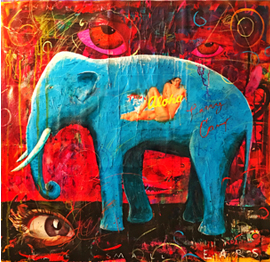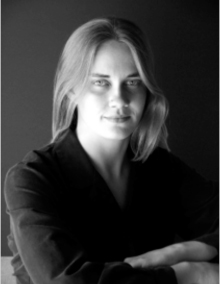Sea lions peek their heads up
like periscopes to stare
at the bipedals corrupting
the rocky shore. Each time
the waves sweep the blue black
pebbles and roll back into themselves
the stones applaud the effort
it must take to be the tide.
Atop the fisted cliff jutting from the shallows
perch a thousand Murres and beyond them
a thousand more who will never know
the prison of a cage or a too-small wage
or the death that awaits them
beyond their knowing.
They understand the sea, the cycles of the sun,
the threat of eagles stealing their young,
the cacophony of seagulls
who catch their unhatched progeny
and return each day for more
as if this is what they live for.
We make words for everything,
name every species we find,
but there’s no word for the distance
between the clumsy penguin-like birds’ desire
to nest in the crags,
the long-necked Cormorants’ skill
for fishing the bay,
the sea lions’ bellies buoying
on the water,
and my urge to pitch into their world
and unmake myself.
The Seedlings
You are not alive
as I am alive
but it seems every minute
you are
climbing for the first time
out of your bed
in the kitchen window
and provoking the others
to do the same
The morning before you broke
ground I was worried
the soil would be too much
for you to overcome
Now I follow
my grandmother’s practice
stand close and whisper
encouragement to your leaves
while you turn closer each second
to the light
You are alive in a way
I am not alive
so I sing to you
Felicity died on a cold metal table
On a towel she lay unshaken
but uncalm from my perspective
she breathed a sigh, looked
from the table toward the walls, pale
and unmoving, she was a stone
or so I wanted her to be, stoic
and free from my misery, the veterinarian’s
needle touched her leg, pointed
to the place it would enter and stop
her heart, I held her head unnecessarily
still, she had no intention
of running and couldn’t know the darkness
as I imagined it coming, solid
and impassible, I wanted to see light in her
I wanted a final flinch from her muscles’
small slack ropes, her eyes did not close finally
but couldn’t see, the room was the same, cold table without
a place to go after the body has given up
her hair, black and white, fell out and came home with me
to the bed where I lay with the orange tabby
who licked the tips of my fingers
as if there exists a scent for sorrow, as if hungry.
Lives of Elephants
She wants to paint the horizon, the way it bends
at the edges, the way it becomes
an unreachable branch where light meets the river.
When the man dips her brush in the paint,
she wants it to be black like distant water.
She wants to show how she bathed her baby
under the yellow sun. The man points his finger
at the blank canvas and the people
whisper What will she paint? How
does her trunk move so precisely?
She wants to choose her own colors, to sweep
the brush in soft lines that remind her
of her mother, the trail they took each year
following the water, the leaves, like paint strokes,
but the brush makes what it always makes:
three purples flowers with stems and green leaves
she has never seen
 “Painting Elephants”
“Painting Elephants”
David Andersen
28×28, Mixed media on canvas
Notes:
Dark Matter’s mission asks the question, “How shall we live in these times?” We live in confusion about our own natures as something quite animal and yet separate from the “wild” that we shield ourselves from both physically and philosophically. In his book Becoming Animal: An Earthly Cosmology, David Abram notes that, “We are by now so accustomed to the cult of expertise that the very notion of honoring and paying heed to our directly felt experience of things—of insects and wooden floors, of broken-down cars and bird-pecked apples and the scent rising from the soil—seems odd and somewhat misguided as a way to find out what’s worth knowing…This directly experienced terrain, rippling with cricket rhythms and scoured by the tides, is the very realm now most ravaged by the spreading consequences of our disregard” (4-6). My poems explore how humans crave the natural world just as we’re so eager to escape it, how we mold animals and plants to serve our needs without considering the consequences to them or us, how our desire to anthropomorphize everything blinds us to a beauty that exists beyond ourselves. There’s a loneliness in our “cult of expertise” that I hope to embody in my poems as a way of questioning our place in the world and to make note of the power of the planet we’ve found ourselves on.
About the Author

Jaime R. Wood is the author of Living Voices: Multicultural Poetry in the Middle School Classroom (NCTE 2006). Her poems have appeared in Dislocate, Matter, Juked, ZYZZYVA, DIAGRAM, Phantom Drift, among others. She currently lives in Portland, Oregon, with her cat Alistair, who has trained her to turn on the water faucet every morning so he can drink out of the sink.
Return to top